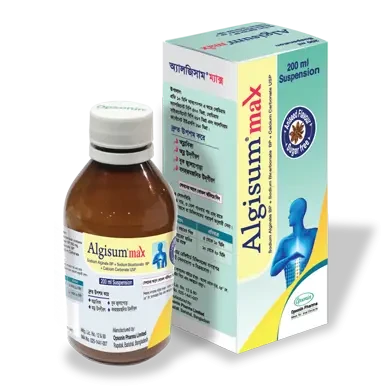Algisum Max Oral Suspension
Pack Image
(500 mg+267 mg+160 mg)/10 ml
200 ml bottle:
৳ 300.00
Also available as:
Indications
Algisum Max is indicated in-
- Gastric reflux
- Heartburn
- Indigestion
- Flatulence associated with gastric reflux
- Heartburn of pregnancy
- All cases of epigastric and retrosternal distress where the underlying cause is gastric reflux.
Pharmacology
This is the combination of two antacids (Calcium carbonate and Sodium bicarbonate) and an alginate (Sodium alginate). The suspension work in two ways-
- Neutralizing excess stomach acid to relieve the pain & discomfort
- Forming a protective barrier over the stomach contents to soothe the burning pain in your chest.
Dosage & Administration
For oral suspension:
Hepatic Impairment: No dose modification necessary.
Renal Insufficiency: Caution if highly restricted salt diet is necessary.
- Adult and children over 12 years:10-20 mL after meals and at bedtime, up to four times a day.
- Children 6 to 12 years: 5-10 mL after meals and at bedtime, up to four times a day.
- Children under 6 years: Not recommended.
- Elderly: No dose modifications necessary.
- Adults and children 12 years and over: Take two to four tablets after meals and at bedtime, up to four times a day.
- Children under 12 years: Tablets should be given only on medical advice.
Hepatic Impairment: No dose modification necessary.
Renal Insufficiency: Caution if highly restricted salt diet is necessary.
Interaction
A time-interval of 2 hours should be considered between Algisum Max intake and the administration of other medicinal products, especially Tetracyclines, Digoxine, Fluoroquinolone, Iron salt, Ketoconazole, Neuroleptics, Thyroid Hormones, Penicillamine, beta-blockers (Atenolol, Metoprolol, Propranolol), Glucocorticoid, Chloroquine and Biphosphonates (diphosphonates) and Estramustine.
Contraindications
This product is contraindicated in patients with known or suspected hypersensitivity to the active ingredients or to any of the excipients.
Side Effects
In addition to the desired effect of the drug, some side effects may appear such as: constipation, flatulence, stomach cramp or belching. In these cases consult a physician. If too big dose has been taken, there might appear a sensation of swelling. In this case, it is advisable to consult a physician.
Pregnancy & Lactation
Pregnancy: Clinical studies in more than 500 pregnant women, as well as a large amount of data from post-marketing experience, indicate no malformative nor feto/neonatal toxicity of the active ingredients. This drug can be used during pregnancy, if clinically needed.
Breastfeeding: No effects of the active substances have been shown in breastfed newborns/infants of treated mothers. This drug can be used during breastfeeding.
Fertility: Pre-clinical investigations have revealed Alginate has no negative effect on parental or offspring fertility or reproduction. Clinical data do not suggest that this drug has an effect on human fertility.
Breastfeeding: No effects of the active substances have been shown in breastfed newborns/infants of treated mothers. This drug can be used during breastfeeding.
Fertility: Pre-clinical investigations have revealed Alginate has no negative effect on parental or offspring fertility or reproduction. Clinical data do not suggest that this drug has an effect on human fertility.
Precautions & Warnings
Each 20 ml of dose has a sodium content of 254.5 mg (11.06 mmol). This should be taken into account when a highly restricted salt diet is recommended, e.g. in some cases of congestive cardiac failure and renal impairment.
Each 20 ml contains 260 mg (6.5 mmol) of calcium. Care needs to be taken in treating patients with hypercalcaemia, nephrocalcinosis, and recurrent calcium containing renal calculi.
Treatment of children younger than 12 years of age is not generally recommended, except on medical advice.
Algisum Max is considered high in sodium. This should be taken into account when a highly restricted salt diet is recommended, e.g., in some cases of congestive cardiac failure and renal impairment. Each tablet contains 75 mg of calcium. Care needs to be taken in treating patients with hypercalcaemia, nephrocalcinosis and recurrent calcium containing renal calculi. Due to its aspartame content Algisum Max should not be given to patients with phenylketonuria. If symptoms persist, or treatment is required for more than 7 days continuously, medical advice should be sought. Taking Algisum Max can mask the symptoms of other more serious, underlying medical conditions. It should not be used in patients with impaired renal function/insufficiency and with hypophosphatemia. This may cause allergic reactions.
Each 20 ml contains 260 mg (6.5 mmol) of calcium. Care needs to be taken in treating patients with hypercalcaemia, nephrocalcinosis, and recurrent calcium containing renal calculi.
Treatment of children younger than 12 years of age is not generally recommended, except on medical advice.
Algisum Max is considered high in sodium. This should be taken into account when a highly restricted salt diet is recommended, e.g., in some cases of congestive cardiac failure and renal impairment. Each tablet contains 75 mg of calcium. Care needs to be taken in treating patients with hypercalcaemia, nephrocalcinosis and recurrent calcium containing renal calculi. Due to its aspartame content Algisum Max should not be given to patients with phenylketonuria. If symptoms persist, or treatment is required for more than 7 days continuously, medical advice should be sought. Taking Algisum Max can mask the symptoms of other more serious, underlying medical conditions. It should not be used in patients with impaired renal function/insufficiency and with hypophosphatemia. This may cause allergic reactions.
Overdose Effects
In the event of over dosage symptomatic treatment should be given. The patient may notice abdominal distension.
Therapeutic Class
Antacids
Storage Conditions
Store in a cool (below 30°C) and dry place, away from light. Keep out of the reach of children. Do not refrigerate or freeze.
Common Questions about Algisum Max 500 Suspension
What is Algisum Max 500 Suspension?
Algisum Max 500 Suspension is the combination of two antacids and an alginate. This is commonly used to treat Gastric reflux, Heartburn, Indigestion, Flatulence associated with gastric reflux.
Is Algisum Max 500 Suspension safe in pregnancy?
You can take Algisum Max 500 Suspension if you are pregnant or breast-feeding.


